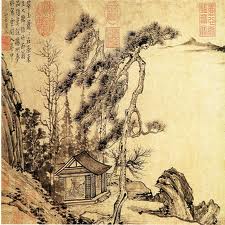By the late Tang dynasty, landscape painting had evolved into an independent genre that embodied the universal longing of cultivated men to escape their quotidian world to commune with nature. Such images might also convey specific social, philosophical, or political convictions. As the Tang dynasty disintegrated, the concept of withdrawal into the natural world became a major thematic focus of poets and painters. Faced with the failure of the human order, learned men sought permanence within the natural world, retreating into the mountains to find a sanctuary from the chaos of dynastic collapse.
Under the Mongol Yuan dynasty, when many educated Chinese were barred from government service, the model of the Song literati retreat evolved into a full-blown alternative culture as this disenfranchised elite transformed their estates into sites for literary gatherings and other cultural pursuits. These gatherings were frequently commemorated in paintings that, rather than presenting a realistic depiction of an actual place, conveyed the shared cultural ideals of a reclusive world through a symbolic shorthand in which a villa might be represented by a humble thatched hut. Because a man’s studio or garden could be viewed as an extension of himself, paintings of such places often served to express the values of their owner.

